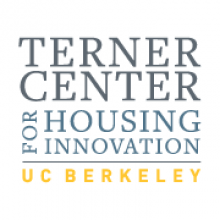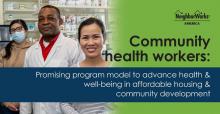Found 166 resources.
0
0
0
Every infant and toddler deserves a safe, stable, and nurturing start in life. That’s why Housing Is has joined forces with Prevent Child Abuse America, SchoolHouse Connection, and ZERO TO THREE to launch Thrive From The Start—a cross-sector effort dedicated to addressing homelessness among infants, toddlers, and expectant parents. Visit thrivefromthestart.org to learn more and explore how you can be a part of the solution.
Topics: Early childhood, Health, Homelessness, Housing, Pre-natal
 Shared by Housing Is
on Apr 9, 2025
Shared by Housing Is
on Apr 9, 2025 0
0
0
Research suggests that two-generation (2Gen) approaches can help interrupt the economic and social barriers to many families’ economic mobility and increased well-being and carry long-term benefits. Child Trends – in partnership with Ascend at the Aspen Institute – conducted new analyses for this report, which provides a current data snapshot of some of the families in the United States who may be eligible for and benefit from 2Gen supports and services. Policymakers, researchers, and program evaluators should pay attention to these same data points in efforts to assess families’ needs and...
Topics: Advocacy, Dual-generation, dual-generation initiative, Low-income, Mobility
 Shared by Molli Caite Hughes
on Jan 18, 2024
Shared by Molli Caite Hughes
on Jan 18, 2024 0
0
0
Marjorie Sims, Sarah Haight
January 2024
Focused on the 23,306 young parents (ages 18 to 24) and their families in New Mexico, this report provides a framework for organizations in New Mexico to collaborate more effectively and offers a plan of action to assess these efforts and strengthen impact for families.
This publication aims to deepen understanding about the demographics, aspirations, and needs of young parents; highlights practices and policies aligned with a two-generation (2Gen) approach; showcases opportunities to streamline this work by forging connections between...
Topics: Child welfare, Dual-generation, dual-generation initiative, Early childhood, Family engagement, Healthy homes, Housing
 Shared by Molli Caite Hughes
on Jan 18, 2024
Shared by Molli Caite Hughes
on Jan 18, 2024 0
0
0
Homelessness and child welfare system involvement pose substantial challenges for families, but supportive housing can help them stay together and access secure housing.
Topics: Advocacy, Dual-generation, Healthy homes, Homelessness, Housing, Low-income, Stability
 Shared by Molli Caite Hughes
on Nov 15, 2023
Shared by Molli Caite Hughes
on Nov 15, 2023 0
0
0
People experiencing homelessness disproportionately face systemic barriers to employment, which make finding and keeping a job neither simple nor easy.
Topics: Advocacy, Homelessness, Low-income, Stability, Workforce development
 Shared by Molli Caite Hughes
on Nov 15, 2023
Shared by Molli Caite Hughes
on Nov 15, 2023 0
0
0

This study aims to quantify the costs of operating PSH—including both the costs of managing the property and providing supportive services—and examine what the implications of insufficient funding are for properties, staff, and residents. Working with a collaborative of seven affordable housing developers in the Bay Area, we analyzed data on operating and supportive services expenses to understand what influences the costs for 26 properties that include PSH units. We then explored how resident outcomes, including participation in resident services, on-time rent payments, and move outs, were...
Topics: Homelessness, Supportive housing
 Shared by Camille Anoll-Hunter
on Aug 11, 2023
Shared by Camille Anoll-Hunter
on Aug 11, 2023 0
0
0

A Community Health Worker Program Development & Toolkit for Affordable Housing and Community Development Organizations
Topics: Health, Healthy homes, Housing
 Shared by Camille Anoll-Hunter
on Aug 3, 2023
Shared by Camille Anoll-Hunter
on Aug 3, 2023 0
0
0

ASTHO comes to our health agencies and partners saddened by our country's recent mass shooting. We mourn the losses of life from firearm violence as our families, schools, and communities continue to be impacted. ASTHO supports you now more than ever. The epidemic of firearm-related injury and death in the United States has become a critical public health and safety concern that affects everyone.
Topics: Community development, Criminal justice, Health, Mental health, Research
 Shared by Sandra Ware
on May 25, 2023
Shared by Sandra Ware
on May 25, 2023 0
0
0
This resource provides guidance to Public Housing Authorities (PHAs), HUD-Assisted communities and other stakeholders wondering how this funding will benefit their communities and what role they can play in ensuring that funds do come to their neighborhoods.
The Department of Commerce’s National Telecommunications and Information Administration (NTIA) published three Notices of Funding Opportunity (NOFO) which will distribute more than $45 billion to states, territories, and tribes for the advancement of broadband infrastructure and digital equity across the country.
The guide also...
Topics: Broadband
 Shared by Malcolm Guy
on Mar 22, 2023
Shared by Malcolm Guy
on Mar 22, 2023 1
0
0

Lessons for funders and social change leaders in search of the best ways to collaborate across sectors to end homelessness.
Topics: Funding, Homelessness, Housing, Low-income, Supportive housing, Youth
 Shared by Sandra Ware
on Jan 3, 2023
Shared by Sandra Ware
on Jan 3, 2023 0
0
0
NCHPH has catalogued promising practices on health center and housing partnerships that were identified during T/TA activities. Some promising practices in this publication include collaboration strategies to address COVID-19, flu vaccination efforts, smoking cessation, access to health care, and more.
Topics: Health
 Shared by Gabe Castro
on Sep 23, 2022
Shared by Gabe Castro
on Sep 23, 2022 0
0
0
This brief describes the findings of an online mapping resource that shows the distribution of Social Determinants of Health (SDOH) indicators across counties with Public Housing Primary Care (PHPC) health centers.
Topics: Place-based
 Shared by Gabe Castro
on Sep 23, 2022
Shared by Gabe Castro
on Sep 23, 2022 0
0
0
Getting regular exercise can be a challenge, but there are many positive benefits, particularly for
people with diabetes.
Topics: Exercise, Health, Healthy homes, Nutrition
 Shared by Gabe Castro
on Sep 23, 2022
Shared by Gabe Castro
on Sep 23, 2022 0
0
0
The Effects of ‘Food Deserts’ on Public Housing Residents Living with Diabetes
Topics: Energy, Exercise, Health, Healthy homes, Mobility, Nutrition
 Shared by Gabe Castro
on Sep 23, 2022
Shared by Gabe Castro
on Sep 23, 2022 0
0
0
This toolkit by NCHPH and NNCC provides information and resources for health center staff to partner and collaborate more effectively with their local housing authorities and with other providers serving residents of public housing and other low-income housing.
Topics: Health, Partnerships
 Shared by Camille Anoll-Hunter
on Sep 23, 2022
Shared by Camille Anoll-Hunter
on Sep 23, 2022 0
0
0
Join the Housing Is Working Group for webinars, member updates, and round table discussions! This resource provides the 2022-2023 Calendar of Events.
Topics: CLPHA, Housing, Housing Is Working Group
 Shared by Camille Anoll-Hunter
on Aug 30, 2022
Shared by Camille Anoll-Hunter
on Aug 30, 2022 0
0
0
A Playbook for Local Health Department Strategies in the United States
Topics: COVID-19, Health
 Shared by Camille Anoll-Hunter
on Aug 26, 2021
Shared by Camille Anoll-Hunter
on Aug 26, 2021 0
0
0
A new D.C. Federal Nutrition Programs Toolkit is designed to help community-based organizations, social service and healthcare providers, District agencies, and community members connect low-income households with federal nutrition programs. Beverley Wheeler, director of D.C. Hunger Solutions, told The DC Line, “with this toolkit, our community leaders can play a key role in ensuring children, young adults, adults, and older adults can connect with the right providers to help gain access to the nutrition they need for their health and well-being.”
Topics: East Coast, Food insecurity
 Shared by Kirsten Greenwell
on Jul 30, 2021
Shared by Kirsten Greenwell
on Jul 30, 2021 0
0
0
Topics: Attendance, COVID-19, Early childhood, Education, Family engagement, Housing, Low-income, Out-of-school time, Youth
 Shared by Kirsten Greenwell
on Jun 17, 2021
Shared by Kirsten Greenwell
on Jun 17, 2021 0
0
0
The National Asian Pacific Center on Aging has launched a an automated COVID-19 in-language helpline and website for older adults and their caregivers.The helpline offers information on prevention, symptoms, and planning in 8 different languages. Each language will have a dedicated 1-800 line so that older adults who are limited English-proficient can immediately learn about the COVID-19 without having to navigate through difficult English prompts.
Topics: Communications
 Shared by Kirsten Greenwell
on Mar 23, 2020
Shared by Kirsten Greenwell
on Mar 23, 2020 0
0
0
Special edition of CLPHA newsletter detailing the organization's efforts in response to COVID-19.
Topics: Advocacy, CLPHA, Communications, Health, Seniors
 Shared by Steve Lucas
on Mar 23, 2020
Shared by Steve Lucas
on Mar 23, 2020 0
0
0
From CDC: "Residents in retirement communities and ILF are considered to be at higher risk of severe COVID-19 outcomes because of older age and because they may have underlying health conditions, such as chronic heart disease, diabetes, or lung disease. They also may be at higher risk of getting and spreading the virus because of community characteristics, such as frequent social activities, and shared dining facilities and communal spaces. Guidance specific to retirement and independent living communities can help the residents, and those who help serve them, slow the spread of the...
Topics: Health, Seniors
 Shared by Steve Lucas
on Mar 22, 2020
Shared by Steve Lucas
on Mar 22, 2020 0
0
0
Offers community-specific COVID-19 mitigation plans and guidance on how to prepare and take action for COVID-19 at home and at workplaces, schools, childcare programs, colleges, universities, large community events/mass gatherings, homeless shelters, and other locations.
Topics: Communications
 Shared by Kirsten Greenwell
on Mar 17, 2020
Shared by Kirsten Greenwell
on Mar 17, 2020 0
0
0
Print resources from the CDC about coronavirus symptoms, prevention, and treatment to distribute and post in your communities.
Topics: Communications
 Shared by Kirsten Greenwell
on Mar 17, 2020
Shared by Kirsten Greenwell
on Mar 17, 2020 